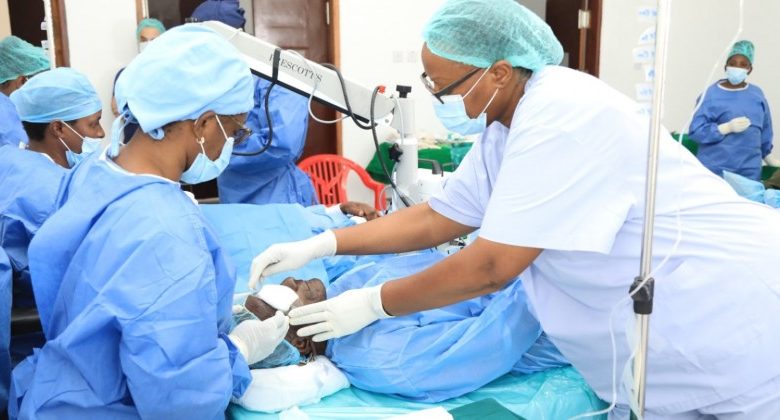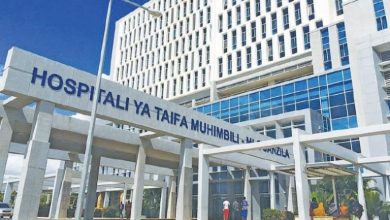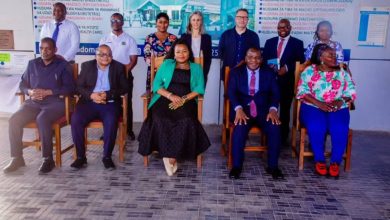Mwinyi underscores CHWs’ role in healthcare

ZANZIBAR: ZANZIBAR President Hussein Mwinyi has commended the growing impact of Community Health Workers (CHWs), describing them as a critical force in transforming public health and accelerating sustainable development across the islands.
Speaking at the first graduation ceremony for CHWs held at Dr Shein Multipurpose Hall, within the State University of Zanzibar (SUZA) in Tunguu, Dr Mwinyi reaffirmed his government’s commitment to expanding access to healthcare in every corner of Unguja and Pemba through well-trained, community-based professionals.
He noted that the government’s goal in establishing the CHW programme is to strengthen citizens’ health as a foundation for economic and social development.
“The government’s commitment has gone beyond planning and is already yielding tangible results in the delivery of quality healthcare services across all levels,” President Mwinyi said.
Addressing a crowd that included enthusiastic CHWs and health professionals, Dr Mwinyi pointed out that while universal healthcare is often seen as a policy concept, through CHWs, the public is now experiencing its real-world application.
“The government’s objective is to ensure every Zanzibari, whether in urban or rural areas of Unguja and Pemba, has access to health services,” he said.
“This graduation marks the beginning of implementing a professional plan to provide health services directly within communities.”
He also highlighted the importance of the emergency referral service for pregnant women and newborns, urging CHWs and community members to utilise the 115-emergency number for urgent maternal and child healthcare.
President Mwinyi described this initiative as a critical step towards reducing maternal and newborn mortality rates, calling on the Ministry of Health to continue training more CHWs with a goal of reaching 3,000 across the islands, due to the proven impact of their services.
He praised the CHWs as pioneers of the national health agenda, trained in knowledge, resilience and patriotism, and expressed confidence in their ability to serve with integrity and strengthen relationships within the communities they serve.
ALSO READ: Tanzania’s free healthcare services to pregnant women hit 65pc target
Dr Mwinyi also advised the graduates to take care of the equipment provided to them, stressing that the tools are valuable and essential for their daily duties.
He spoke about the strong health information systems being built through the CHW programme, noting that these systems will improve planning and reduce congestion at healthcare centres by enhancing primary healthcare delivery.
He expressed hope that the government and the people of Zanzibar would benefit from the work of these well-trained professionals, who are expected to provide quality services, raise awareness and help prevent deadly diseases, ultimately reducing avoidable deaths.
President Mwinyi further praised the improvement of mobile health camps and outreach clinics, attributing their success to the support of development partners.
He pledged that the government, through the Ministry of Health, would continue to support the initiative to ensure CHWs are deployed in every Shehia (ward), village and household in Zanzibar.
He also welcomed progress in the digitalisation of healthcare services, saying it has significantly improved data collection and reporting, thereby enabling better service planning and delivery.
For his part, Zanzibar’s Minister for Health, Nassor Ahmed Mazrui, said a total of 1,242 CHWs had completed their training, including 898 graduates from the pool of Community Health Volunteers (CHVs), while others remain in training institutions across Unguja and Pemba.
He announced that the government now officially recognises CHWs as frontline health workers and expressed pride in having a dedicated and skilled team committed to improving public health.
Meanwhile, Mr Sam Mayanga, Director of Government Grants for East Africa and Mr Riccardo Lampariello, Executive Secretary of D-tree International, voiced strong confidence in the CHWs’ capacity to deliver quality healthcare at the community level.
“We believe you will work in the communities to prevent maternal and child deaths, making Zanzibar a role model for other countries in improving primary healthcare,” they said.
The officers from D-tree commended the Revolutionary Government of Zanzibar for its leadership in implementing the CHW programme, calling it a core pillar of primary health services and pledged continued collaboration to further strengthen the sector.





